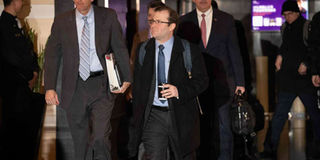US, China hold more trade talks overshadowed by Kim visit

Members of the US trade delegation to China leave a hotel in Beijing on January 7, 2019. PHOTO | WANG ZHAO | AFP
What you need to know:
- This is the first time the two sides have met face-to-face since US President Donald Trump and President Xi Jinping agreed to a tariff truce during a meeting in Argentina on December 1.
Negotiators are seeking to resolve a number of thorny issues that have threatened an all-out trade war between the world's two biggest economies.
Without a resolution, punitive US duty rates on $200 billion in Chinese goods are due to rise to 25 percent from 10 percent on March 2.
A separate geopolitical issue angered China on Monday when a US Navy guided-missile destroyer sailed near disputed islands in the South China Sea -- a vast expanse claimed by Beijing.
BEIJING,
US officials held a second day of trade talks with Chinese counterparts in Beijing on Tuesday, overshadowed by an unannounced visit from North Korean leader Kim Jong Un.
This is the first time the two sides have met face-to-face since US President Donald Trump and President Xi Jinping agreed to a tariff truce during a meeting in Argentina on December 1.
THORNY ISSUES
The US delegation, which is led by Deputy US Trade Representative Jeffrey Gerrish and includes officials from the Treasury, Commerce, Agriculture and Energy departments, left its hotel without talking to reporters ahead of the talks.
Negotiators are seeking to resolve a number of thorny issues that have threatened an all-out trade war between the world's two biggest economies.
These include more Chinese purchases of US goods and services to reduce a yawning trade gap, increased access to China's markets, stronger protection of intellectual property and a reduction in Beijing's subsidies to Chinese companies.
Neither side has yet provided any details about the talks in Beijing.
The temporary ceasefire came after the two sides imposed import duties on more than $300 billion of each other's goods.
CHINA RISKS
US Commerce Secretary Wilbur Ross said Monday that China's economy is more vulnerable to the fallout from the trade war.
"It certainly has hurt the Chinese economy," Ross told CNBC, noting that China exports many more goods to the United States than the other way around.
Mr Ross said there was a "very good chance" of reaching an agreement, although monitoring compliance would present a challenge.
Without a resolution, punitive US duty rates on $200 billion in Chinese goods are due to rise to 25 percent from 10 percent on March 2.
The second day of trade negotiations coincided with an unannounced visit by the North Korean leader for talks with Xi in Beijing, amid speculation of a second meeting between Mr Kim and Mr Trump.
Some analysts say that China -- Pyongyang's key diplomatic ally and main source of trade -- could use Mr Kim's visit as a bargaining chip in the US trade talks.
COINCIDENCE
But Bonnie Glaser, a senior adviser at the Center for Strategic and International Studies, said the timing of the North Korean leader's arrival could be coincidental.
"I don't see any linkage with the trade talks," said Ms Glaser, a senior adviser at the Center for Strategic and International Studies.
"China's ability to use (North Korea) as leverage has diminished considerably since Trump opened his own channel to Kim," she said.
A separate geopolitical issue angered China on Monday when a US Navy guided-missile destroyer sailed near disputed islands in the South China Sea -- a vast expanse claimed by Beijing.
China called it a violation of its sovereignty which has damaged "peace, safety and order" in the waterway.
The United States periodically sends planes and warships through the area to signal to Beijing its right under international law to pass through the waters.





